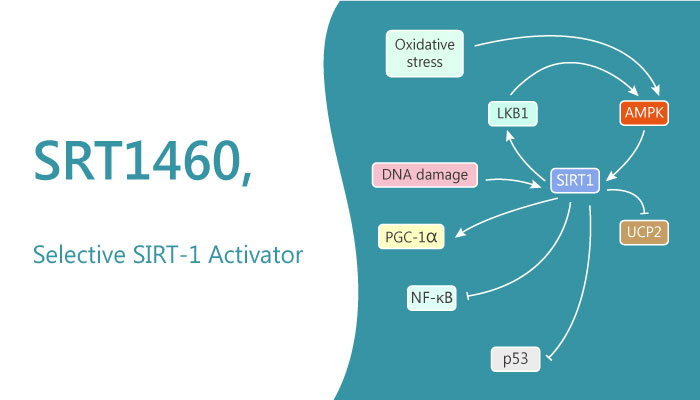Sirtuins are NAD-dependent deacetylases that are involved in physiologic processes. To date, seven mammalian sirtuins have been identified (SIRT1–SIRT7). Sirtuin 1 (SIRT1) is a member of the sirtuin family of proteins. On the one hand, SIRT1 inhibition leads to growth arrest and apoptosis in lymphoma, breast, lung, and epithelial cancer. On the other hand, studies support the role of SIRT1 as a tumor suppressor.
Pancreatic cancer is a leading cause of cancer-related death. Chemotherapy is the primary treatment for most patients with pancreatic cancer. But, the prognosis of pancreatic cancer patients is very poor. Therefore, it is important to find new therapeutic options. In this study, SIRT1 highly express in pancreatic cancer cells. However, SRT 1460 shows inhibiting cell growth and survival of pancreatic cancer cells. SRT1460, as a activator of SIRT1 with an EC1.5 value of 2.9 μM, shows good selectivity for activation of SIRT1 versus SIRT2 and SIRT3 (EC1.5 > 300 μM). It is more potent than Resveratrol and the closest sirtuin homologues.

In vitro, SRT 1460 inhibits cell viability of pancreatic cancer cell lines in a dose-dependent manner. All pancreatic cancer cells were more sensitive to this drug than control HPDE cells. And the IC50s of those cells are 1.62±0.13 μM, 2.31±0.23 μM, 0.66 ±0.02 μM, 2.39±0.29 μM for Patu8988t, SU86.86, Panc-1, HPDE, respectively. On the other hand, pancreatic cancers require autophagy for tumor growth, and that inhibition of autophagy leads to tumor regression, and SRT 1460 inhibit the autophagy flux in pancreatic cancer cells.
In summary, SRT 1460 negatively regulate pancreatic cancer cell growth and viability, and may serve as a potential therapy for pancreatic cancer.
Reference: